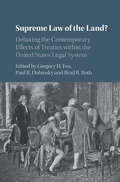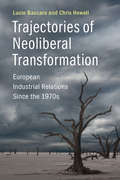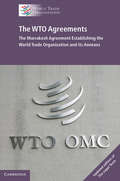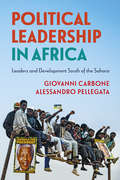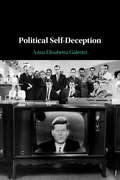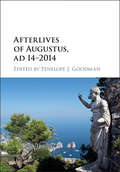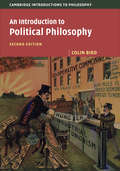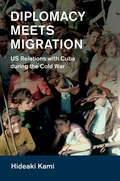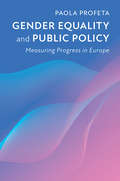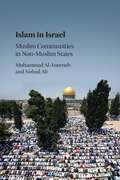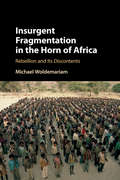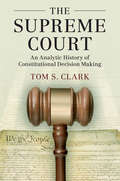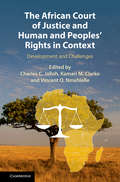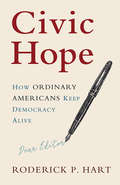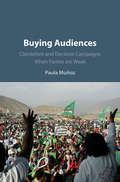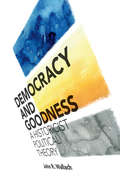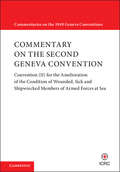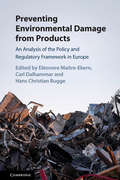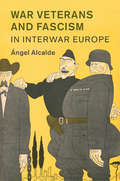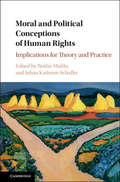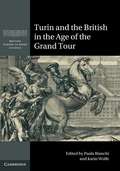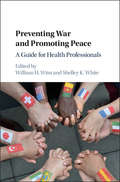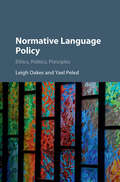- Table View
- List View
Supreme Law of the Land?: Debating the Contemporary Effects of Treaties within the United States Legal System
by Fox Roth Paul R. Gregory H. Dubinsky Brad R.How do treaties function in the American legal system? This book provides a comprehensive analysis of the current status of treaties in American law. Its ten chapters examine major areas of change in treaty law in recent decades, including treaty interpretation, federalism, self-execution, treaty implementing legislation, treaty form, and judicial barriers to treaty enforcement. The book also includes two in-depth case studies: one on the effectiveness of treaties in the regulation of armed conflict and one on the role of a resurgent federalism in complicating US efforts to ratify and implement treaties in private international law. Each chapter asks whether the treaty rules of the 1987 Third Restatement of Foreign Relations Law accurately reflect today's judicial, executive, and legislative practices. This volume is original and provocative, a useful desk companion for judges and practicing lawyers, and an engaging read for the general reader and graduate students.
Trajectories of Neoliberal Transformation: European Industrial Relations Since the 1970s
by Chris Howell Lucio BaccaroThis book has both empirical and theoretical goals. The primary empirical goal is to examine the evolution of industrial relations in Western Europe from the end of the 1970s up to the present. Its purpose is to evaluate the extent to which liberalization has taken hold of European industrial relations and institutions through five detailed, chapter-length studies, each focusing on a different country and including quantitative analysis. The book offers a comprehensive description and analysis of what has happened to the institutions that regulate the labor market, as well as the relations between employers, unions, and states in Western Europe since the collapse of the long postwar boom. The primary theoretical goal of this book is to provide a critical examination of some of the central claims of comparative political economy, particularly those involving the role and resilience of national institutions in regulating and managing capitalist political economies.
The WTO Agreements: The Marrakesh Agreement Establishing the World Trade Organization and its Annexes
by World Trade OrganizationThis publication contains the text of the WTO's founding agreement, the 1994 Marrakesh Agreement Establishing the World Trade Organization, and its Annexes, including all amendments and additions since its entry into force until September 2017. <P><P>These include an amendment to the WTO's intellectual property agreement (TRIPS Agreement) aimed at improving developing countries' access to medicines, the WTO's Trade Facilitation Agreement, which entered into force in February 2017, an amendment adopted in July 2017 to extend the frequency of peer review periods under the Trade Policy Review Mechanism as of 2019, and the amended Government Procurement Agreement. <P>This publication updates and replaces The Legal Texts: The Results of the Uruguay Round of Multilateral Trade Negotiations, which was first printed in 1994. <P>Includes the complete and official texts of the WTO agreements in one collection.<P> Provides an indispensable guide to all WTO trade-related negotiations.<P> Updates and replaces The Legal Texts: The Results of the Uruguay Round of Multilateral Trade Negotiations (1994).
Political Leadership in Africa: Leaders and Development South of the Sahara
by Giovanni Carbone Alessandro PellegataDo political leaders matter for development in Africa? Political leaders south of the Sahara have taken centre stage since countries in the region gained independence in the 1960s, yet a 'leadership trap' soon emerged with power-holders overstaying in office and chronic instability caused by coups resulting in decades of disappointing developmental performances. The beginnings of change are found in political reforms of the early 1990s, with many sub-Saharan countries introducing multiparty elections and an increasingly regular succession of leaders. But what impact did the new mechanisms for selecting leaders have on the political stabilization of African states, on the growth of their economies, and on the welfare of ordinary citizens? Drawing on a new dataset called the Africa Leadership Change (ALC), this innovative analysis of political leadership in Africa investigates the distinct leadership dynamics of development processes across the region from 1960 to 2018, revealing how, as Africa began to change its leaders and the way they reach power, these new leaders themselves began to change Africa.
Political Self-Deception
by Anna Elisabetta GaleottiSelf-deception, that is the distortion of reality against the available evidence and according to one's wishes, represents a distinctive component in the wide realm of political deception. It has received relatively little attention but is well worth examining for its explanatory and normative dimensions. In this book Elisabetta Galeotti shows how self-deception can explain political occurrences where public deception intertwines with political failure – from bad decisions based on false beliefs, through the self-serving nature of those beliefs, to the deception of the public as a by-product of a leader's self-deception. Her discussion uses close analysis of three well-known case studies: John F. Kennedy and the Cuba Crisis, Lyndon B. Johnson and the Gulf of Tonkin Resolution, and George W. Bush and the Weapons of Mass Destruction. Her book will appeal to a range of readers in political philosophy, political theory, and international relations.
Afterlives of Augustus, AD 14–2014
by Penelope J. GoodmanThe bi-millennium of Augustus' death on 19 August 2014 commemorated not only the end of his life but also the beginning of a two-thousand-year reception history. This volume addresses the range and breadth of that history. <P><P>Beginning with the Emperor's death and continuing through Late Antiquity, Early Christianity, the Middle Ages, the Renaissance and early modernity to the present day, chapters address political positioning, religious mythologisation, philosophy, rhetoric, narratives, memory, and material embodiment. As they collectively reveal, Augustus has meant radically different things from one time and place to another, and even to some individual commentators as the circumstances around them changed. The weight of established narratives has often also shaped those of subsequent generations, with or without their conscious awareness. The book outlines and analyses the major themes in Augustus' reception history, clarifying the cultural and historiographical issues at stake and providing a platform for further scholarship.<P> Gives a holistic view of Augustus' reception history from his death to the present day.<P> Demonstrates how much assessments of Augustus have always depended on the values and experiences of the viewer.<P> Uses the post-Classical receptions material at the heart of the book to cast valuable light back on the study of the historical Augustus.
Political Protest in Contemporary Africa
by Lisa MuellerFrom spray-painted slogans in Senegal to student uprisings in South Africa, twenty-first century Africa has seen an explosion of protests and social movements. But why? Protests flourish amidst an emerging middle class whose members desire political influence and possess the money, education, and political autonomy to effectively launch movements for democratic renewal. In contrast with pro-democracy protest leaders, rank-and-file protesters live at a subsistence level and are motivated by material concerns over any grievance against a ruling regime. Through extensive field research, Lisa Mueller shows that middle-class political grievances help explain the timing of protests, while lower-class material grievances explain the participation. By adapting a class-based analysis to African cases where class is often assumed to be irrelevant, Lisa Mueller provides a rigorous yet accessible explanation for why sub-Saharan Africa erupted in unrest at a time of apparent economic prosperity.
An Introduction to Political Philosophy (Cambridge Introductions to Philosophy)
by Colin BirdNow revised and updated and containing several entirely new chapters, this book provides a comprehensive introduction to political philosophy. It discusses historical and contemporary figures and covers a vast range of topics and debates, including immigration, war, national and global economics, the ethical and political implications of climate change, and the persistence of racial oppression and injustice. It also presents accessible, non-technical discussions of perfectionism, utilitarianism, theories of the social contract, and the Marxian tradition of social criticism. Real-life examples introduce students to ways of using philosophical reflection and debates, and open up new perspectives on politics and political issues. Throughout, this book challenges readers to think critically about political arguments and institutions that they might otherwise take for granted. It will be a vital and provocative resource for any student of philosophy or political science.
Diplomacy Meets Migration: US Relations with Cuba during the Cold War (Cambridge Studies in US Foreign Relations)
by Hideaki KamiDiplomacy Meets Migration examines diplomacy, migration, and the history of US relations with Cuba during the Cold War. Hideaki Kami draws on declassified US and Cuban diplomatic sources, as well as Miami-Cuban lobby records, to challenge traditional interpretations that mainly focus on the two national capitals, Washington and Havana. By incorporating Miami into the story of foreign affairs, Kami assesses the intersection between migration and diplomacy, and considers how migration emerged as a critical issue that shaped the dynamism of US relations with Cuba. Kami demonstrates that the US government reformulated its Cuban policy in response to Fidel Castro's institutionalization of power, while simultaneously trying to build a new relationship with the Miami Cuban community, a new, politically mobilized constituency within US society. He shows how both migration control and migrant politics became important components of US foreign policy, which in turn influenced Cuban policy toward the United States.
Gender Equality and Public Policy: Measuring Progress in Europe
by Paola ProfetaDespite formal UN and European Commission commitments to improve gender imbalances, progress towards gender equality in wealth and pay has progressed at a discouragingly slow pace in recent decades. European countries have been more proactive in their support for corrective policies, such as family leave and gender quotas for corporate boards, yet measuring the effectiveness of these policies has proven difficult. This book offers a close comparative analysis of gender-targeted policies in Europe, providing an in-depth overview of how public policy is shaping gender equality, and how the presence of women in the economy and decision-making positions is itself shaping public policy. Paola Profeta bases her analysis on new data and an innovative interdisciplinary perspective for understanding the relationship between gender, equality and public policy, and their final impact on the European economy and society, with lessons that resonate beyond Europe.
Islam in Israel: Muslim Communities in Non-Muslim States
by Nohad Ali Muhammad Al-AtawnehIslam is the religion of the majority of Arab citizens in Israel and since the late 1970s has become an important factor in their political and socio-cultural identity. This leads to an increasing number of Muslims in Israel who define their identity first and foremost in relation to their religious affiliation. By examining this evolving religious identity during the past four decades and its impact on the religious and socio-cultural aspects of Muslim life in Israel, Muhammad Al-Atawneh and Nohad Ali explore the local nature of Islam. They find that Muslims in Israel seem to rely heavily on the prominent Islamic authorities in the region, perhaps more so than minority Muslims elsewhere. This stems, inter alia, from the fact that Muslims in Israel are the only minority that lives in a land they consider to be holy and see themselves as a natural.
Insurgent Fragmentation in the Horn of Africa: Rebellion and its Discontents
by Michael WoldemariamWhen insurgent organizations factionalize and fragment, it can profoundly shape a civil war: its intensity, outcome, and duration. In this extended treatment of this complex and important phenomenon, Michael Woldemariam examines why rebel organizations fragment through a unique historical analysis of the Horn of Africa's civil wars. Central to his view is that rebel factionalism is conditioned by battlefield developments. While fragmentation is caused by territorial gains and losses, counter-intuitively territorial stalemate tends to promote rebel cohesion and is a critical basis for cooperation in war. As a rare effort to examine these issues in the context of the Horn of Africa region, based upon extensive fieldwork, this book will interest both scholarly and non-scholarly audiences interested in insurgent groups and conflict dynamics.
The Supreme Court: An Analytic History of Constitutional Decision Making (Political Economy of Institutions and Decisions)
by Tom S. ClarkThis book presents a quantitative history of constitutional law in the United States and brings together humanistic and social-scientific approaches to studying law. Using theoretical models of adjudication, Tom S. Clark presents a statistical model of law and uses the model to document the historical development of constitutional law. Using sophisticated statistical methods and historical analysis of court decisions, the author documents how social and political forces shape the path of law. Spanning the history of constitutional law since Reconstruction, this book illustrates the way in which the law evolves with American life and argues that a social-scientific approach to the history of law illuminates connections across disparate areas of the law, connected by the social context in which the Constitution has been interpreted.
The African Court of Justice and Human and Peoples' Rights in Context: Development and Challenges
by Charles C. Jalloh Kamari M. Clarke Vincent O. NmehielleThe treaty creating the African Court of Justice and Human and Peoples' Rights, if and when it comes into force, contains innovative elements that have potentially significant implications for current substantive and procedural approaches to regional and international dispute settlements. Bringing together leading authorities in international criminal law, human rights and transitional justice, this volume provides the first comprehensive analysis of the 'Malabo Protocol' while situating it within the wider fields of international law and international relations. The book, edited by Professors Jalloh, Clarke and Nmehielle, offers scholarly, empirical, critically engaged and practical analyses of some of its most challenging provisions. Breaking new ground on the African Court, but also treating old concepts in a novel and relevant way, The African Court of Justice and Human and Peoples' Rights in Context is for anyone interested in international law, including international criminal law and international human rights law. This title is also available as Open Access on Cambridge Core.
Civic Hope: How Ordinary Americans Keep Democracy Alive (Communication, Society And Politics)
by Rodrick P. HartCivic Hope is a history of what everyday Americans say – in their own words – about the government overseeing their lives. Based on a highly original analysis of 10,000 letters to the editor from 1948 to the present published in twelve US cities, the book overcomes the limitations of survey data by revealing the reasons for people’s attitudes. While Hart identifies worrisome trends – including a decline in writers’ abilities to explain what their opponents believe and their attachment to national touchstones – he also shows why the nation still thrives. Civic Hope makes a powerful case that the vitality of a democracy lies not in its strengths but in its weaknesses, and in the willingness of its people to address those weaknesses without surcease. The key, Hart argues, is to sustain a culture of argument at the grassroots level.
Buying Audiences: Clientelism and Electoral Campaigns When Parties Are Weak
by Paula MuñozScholars typically emphasize the importance of organized networks and long-term relationships for sustaining electoral clientelism. Yet electoral clientelism remains widespread in many countries despite the weakening of organized parties. This book offers a new account of how clientelism and campaigning work in weak party systems and in the absence of stable party-broker relationships. Drawing on an in-depth study of Peru using a mixed methods approach and cross-national comparisons, Muñoz reveals the informational and indirect effects of investments made at the campaign stage. By distributing gifts, politicians buy the participation of poor voters at campaign events. This helps politicians improvise political organizations, persuade poor voters of candidates' desirability, and signal electoral viability to strategic donors and voters, with campaign dynamics ultimately shaping electoral outcomes. Among other contributions, the book sheds new light on role of donations and business actors and on ongoing challenges to party building.
Democracy and Goodness: A Historicist Political Theory
by John R. WallachCitizens, political leaders, and scholars invoke the term 'democracy' to describe present-day states without grasping its roots or prospects in theory or practice. This book clarifies the political discourse about democracy by identifying that its primary focus is human activity, not consent. It points out how democracy is neither self-legitimating nor self-justifying and so requires critical, ethical discourse to address its ongoing problems, such as inequality and exclusion. Wallach pinpoints how democracy has historically depended on notions of goodness to ratify its power. The book analyses pivotal concepts of democratic ethics such as 'virtue', 'representation', 'civil rightness', 'legitimacy', and 'human rights' and looks at them as practical versions of goodness that have adapted democracy to new constellations of power in history. Wallach notes how democratic ethics should never be reduced to power or moral ideals. Historical understanding needs to come first to highlight the potentials and prospects of democratic citizenship.
Commentary on the Second Geneva Convention: Convention (II) for the Amelioration of the Condition of Wounded, Sick and Shipwrecked Members of Armed Forces at Sea (Commentaries on the 1949 Geneva Conventions)
by Lindsey Cameron Eve Knut Dörmann Liesbeth Lijnzaad Marco Sassòli Bruno Demeyere La Haye Heike Philip Spoerri Niebergall-Lackner Jean-Marie HenckaertsThe application and interpretation of the four Geneva Conventions of 1949 have developed significantly in the sixty years since the International Committee of the Red Cross (ICRC) first published its Commentaries on these important humanitarian treaties. To promote a better understanding of, and respect for, this body of law, the ICRC commissioned a comprehensive update of its original Commentaries, of which this is the second volume. Its preparation was coordinated by Jean-Marie Henckaerts, ICRC legal adviser and head of the project to update the Commentaries. The Second Convention is a key text of international humanitarian law. It contains the essential rules on the protection of the wounded, sick and shipwrecked at sea, those assigned to their care, and the vessels used for their treatment and evacuation. This article-by-article Commentary takes into account developments in the law and practice to provide up-to-date interpretations of the Convention. The new Commentary has been reviewed by humanitarian-law practitioners and academics from around the world, including naval experts. It is an essential tool for anyone working or studying within this field. The second installment in a series of article-by-article commentaries on the Second Geneva Convention and Additional Protocols issued by the International Committee of the Red Cross, capturing contemporary developments in their application and interpretation. Contains thorough and up-to-date interpretations from an extensive process involving both the International Committee of the Red Cross and external contributors, as well as peer review by academics and international humanitarian law practitioners, ensuring coherent content while accurately reflecting diverging views. Provides practitioners and scholars with easy access to comprehensive, high-quality legal information.
When Soldiers Rebel: Ethnic Armies and Political Instability in Africa
by Kristen A. HarknessMilitary coups are a constant threat in Africa and many former military leaders are now in control of 'civilian states', yet the military remains understudied, especially over the last decade. Drawing on extensive archival research, cross-national data, and four in-depth comparative case studies, When Soldiers Rebel examines the causes of military coups in post-independence Africa and looks at the relationship between ethnic armies and political instability in the region. Kristen A. Harkness argues that the processes of creating and dismantling ethnically exclusionary state institutions engenders organized and violent political resistance. Focusing on rebellions to protect rather than change the status quo, Harkness sheds light on a mechanism of ethnic violence that helps us understand both the motivations and timing of rebellion, and the rarity of group rebellion in the face of persistent political and economic inequalities along ethnic lines.
Preventing Environmental Damage from Products: An Analysis Of The Policy And Regulatory Framework In Europe
by Carl Dalhammar Hans Christian Bugge Eléonore Maitre-EkernHow to tackle environmental damage from the throwaway society is one of the defining questions of the twenty-first century. By establishing a circular economy, we can encourage and support sustainable production and consumption. <P><P>These essays by an international group of leading scholars from a range of disciplines analyse policies and legal instruments and challenge mainstream assumptions, from the choice of a policy mix to the actual effect of imposing standards on the market, and from corporate objectives and priorities to the use of precaution in assessing particularly harmful substances. <P>Each chapter contributes to a better understanding of the current policy and regulatory framework in Europe and identifies the challenges and opportunities ahead. The book breaks new ground by examining how product policies can contribute to important objectives and visions, such as the aims of the circular economy. It is a must-read for researchers as well as for policymakers and practitioners.<P> Explores a very topical but under-researched field.<P> Opens new perspectives on environmental product regulation.<P> Illustrates arguments with concrete examples from the law and from the practice.
War Veterans and Fascism in Interwar Europe (Studies in the Social and Cultural History of Modern Warfare #50)
by Ángel AlcaldeThis book explores, from a transnational viewpoint, the historical relationship between war veterans and fascism in interwar Europe. Until now, historians have been roughly divided between those who assume that 'brutalization' (George L. Mosse) led veterans to join fascist movements and those who stress that most ex-soldiers of the Great War became committed pacifists and internationalists. Transcending the debates of the brutalization thesis and drawing upon a wide range of archival and published sources, this work focuses on the interrelated processes of transnationalization and the fascist permeation of veterans' politics in interwar Europe to offer a wider perspective on the history of both fascism and veterans' movements. A combination of mythical constructs, transfers, political communication, encounters and networks within a transnational space explain the relationship between veterans and fascism. Thus, this book offers new insights into the essential ties between fascism and war, and contributes to the theorization of transnational fascism. Offers a Europe-wide transnational perspective on the complex phenomenon of fascism Analyzes the cultural, sociological and political origins of fascism and its proliferations across Europe Transcends the traditional paradigm of the 'brutalization' thesis and challenges conventional views of war veterans' identities and history
Moral and Political Conceptions of Human Rights: Implications for Theory and Practice
by Reidar Maliks Schaffer Johan KarlssonIn recent years, political philosophers have debated whether human rights are a special class of moral rights we all possess simply by virtue of our common humanity and which are universal in time and space, or whether they are essentially modern political constructs defined by the role they play in an international legal-political practice that regulates the relationship between the governments of sovereign states and their citizens. This edited volume sets out to further this debate and move it ahead by rethinking some of its fundamental premises and by applying it to new and challenging domains, such as socio-economic rights, indigenous rights, the rights of immigrants and the human rights responsibilities of corporations. Beyond the philosophy of human rights, the book has a broader relevance by contributing to key themes in the methodology of political philosophy and by addressing urgent issues in contemporary global policy making.
British School at Rome Studies: Turin and the British in the Age of the Grand Tour (British School at Rome Studies)
by Paola Bianchi Karin WolfeThe Duchy of Savoy first claimed royal status in the seventeenth century, but only in 1713 was Victor Amadeus II, Duke of Savoy (1666-1732), crowned King of Sicily. The events of the Peace of Utrecht (1713) sanctioned the decades-long project, the Duchy had pursued through the convoluted maze of political relationships between foreign powers. Of these, the British Kingdom was one of their most assiduous advocates, because of complimentary dynastic, political, cultural and commercial interests. A notable stream of British diplomats and visitors to the Sabaudian capital engaged in an extraordinary and reciprocal exchange with the Turinese during this fertile period. The flow of travellers, a number of whom were British emissaries and envoys posted to the court, coincided, in part, with the itineraries of the international Grand Tour which transformed the capital into a gateway to Italy, resulting in a conflagration of cultural cosmopolitanism in early modern Europe.
Preventing War and Promoting Peace: A Guide for Health Professionals
by William H. Wiist Shelley K. WhitePreventing War and Promoting Peace: A Guide for Health Professionals is an interdisciplinary study of how pervasive militarism creates a propensity for war through the influence of academia, economic policy, the defense industry, and the news media. Comprising contributions by academics and practitioners from the fields of public health, medicine, nursing, law, sociology, psychology, political science, and peace and conflict studies, as well as representatives from organizations active in war prevention, the book emphasizes the underlying preventable causes of war, particularly militarism, and focuses on the methods health professionals can use to prevent war. Preventing War and Promoting Peace provides hard-hitting facts about the devastating health effects of war and a broad perspective on war and health, presenting a new paradigm for the proactive engagement of health professions in the prevention of war and the promotion of peace.
Normative Language Policy: Ethics, Politics, Principles
by Leigh Oakes Yael PeledLanguage politics in the new global era presents policymakers with significant ethical challenges. How should the reality of English as a global language influence the normative considerations underpinning national language policies? What moral arguments justify the imposition of national languages in an era of increased immigration and ethnolinguistic diversity? What role is there for non-dominant varieties in a globalised world? Building on the emerging notion of 'normative language policy', this book proposes an integrated framework for the study of such questions, combining recent normative work on language in political theory and philosophy with empirically-derived insight from the fields of sociolinguistics and applied linguistics. The case of Quebec forms the backdrop of the study, providing a particularly illuminating setting for investigating the common moral challenges that face contemporary polities seeking to maintain distinct linguistic identities, in an irreducibly diverse world increasingly dominated by English as a global lingua franca.
